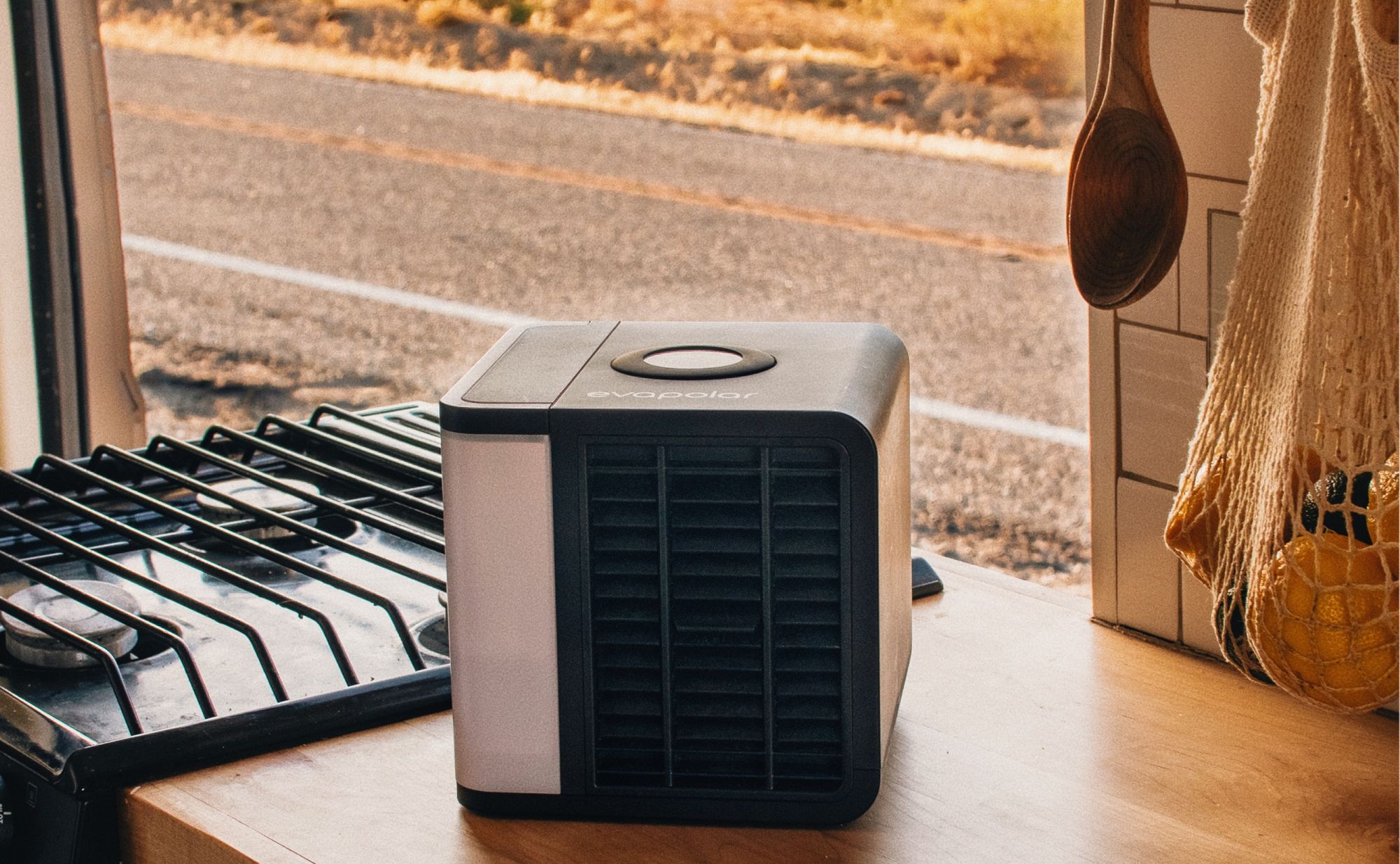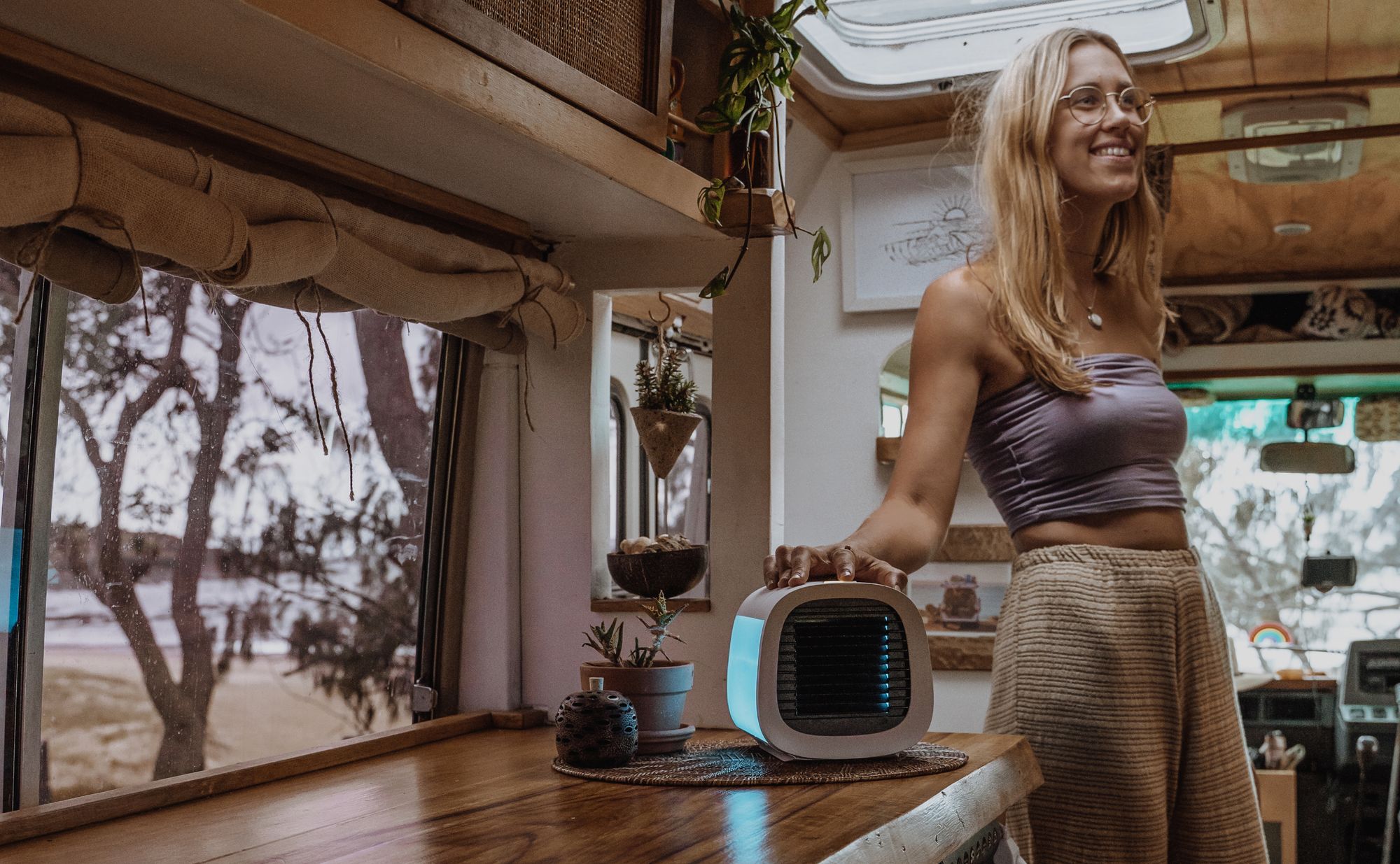A trip with your recreational vehicle (RV) is one of the greatest experiences for adventure lovers. Still, your journey may be tainted unless you invest in your comfort. Can you imagine admiring stunning summer landscapes while sweating behind the wheel? Neither can we. Our advice: don’t forget to choose an air conditioner for your recreational vehicle (RV) wisely and you will beat the heat during the warmer part of the camping season.

evaCHILL
The most effective cooling device
The market is flooded with options today, so it can be tough to pick the right one. It is even more challenging if you don’t have experience in this area. You surely should opt for something reliable and long-lasting. But don’t worry! To ensure that you don’t make any mistakes, we’ve shared our experience on how Evapolar devices have solved clients’ problems.
In this comprehensive guide on how to choose a portable air conditioner caravan or a camper van, we’ve prepared several pieces of advice on how to choose among the different types and what are their pros and cons compared to Evapolar.
Keep reading to know what to look out for when making your purchase decision.
And if you’re looking for a portable unit or mini AC specifically, we have in-depth guides on those topics too!
Improve the Overall Comfort Level of Your RV

Your tastes and lifestyle play a key role in solving the problem of how to choose a portable air conditioner for a camper. A too bulky unit will bring discomfort. A noisy one can disrupt your peace or mood. A too powerful AC system will waste your resources.
Are you an active camper on the go? Thus, you’re looking to cool a relatively small space. Think also about the features that matter most to you. Perhaps, you’d love remote control or one-touch operation. Make a short list of your key criteria – and start shopping around!
Here are the questions to help you make this list before choosing an RV AC system:
- How often will you stay in your RV?
- In which regions do you travel?
- At what times of the year do you travel?
- How many people will be traveling with you?
- Do you often cook in the RV?
Do they seem confusing or complicated? Not all! The answer will help you ensure your comfort.
How Often You Stay in Your RV
Is your RV your second home and you spend lots of time there? Look at high-quality devices. Those with a heavy-duty compressor chill your RV and let you use AC often. Otherwise, buying a really powerful AC system would be an overspending. Money loves to be counted, doesn’t it?
In Which Regions You Travel
Do you plan a trip to an area that regularly sees over 90 degrees and is humid? Our tip: pick an AC with three functions, namely cooling, dehumidifying, and heating (for cold nights). However, if you just need some cooling down at your sleeping block at night (or, perhaps, during a hot afternoon) while you’re on vacation, any AC unit should do.

At What Times of the Year You Travel
Seasons matter. So be sure to check the usual temperatures of your destination. Most people travel in summer. It means hot weather and calls for choosing an AC system that’s more powerful. Surely, it consumes more electricity but guarantees your comfort. If your journey is in wintertime, you can safely opt for a milder, energy-efficient option.
How Many People Will Be Traveling with You
Are you traveling alone? Maybe with your loved one? Or, you go on a family trip with kids? These options require various types of camper van AC units. For one person or a couple, most cooler types may work (still, pick carefully!) But if your family is larger than three, you need an air conditioning system with enough cooling power for everyone inside. For example, pick the evaLIGHT personal air cooler as a portable alternative to an AC. Powerful? Oh yes, it can keep a fully packed camper van cool and comfortable for everyone, especially in dry climates.

How Often Do You Cook in the RV
Can’t imagine a road trip without some real food? Traveling with an RV, you quickly grow tired of fast food or packaged sandwiches and burgers. How to get homemade food when on the road? Cooking over a campfire gives you this opportunity. Yet, doing it with limited space and equipment can be challenging, though.
The more steam and heat your cooking generates inside your camper van, the more cooling power you will need.
Important Criteria When Buying Air Conditioners for RV
Ok, now you know what exactly you want from a portable camper air conditioner. Let’s move on to decide on how to pick up AC for RV based on the concrete characteristics of the selected model.
Let’s discuss the key factors to make a wise choice:
- Cooler size
- Cooler capacity
- Energy consumption
- Safety
- Maintenance
- Portability and energy efficiency
- Functionality
- Price
Cooler Size
Pick the AC unit size that fits your space. Of course, you can place any product in a recreational vehicle or camper van. Will it be comfortable? Not necessarily. So, look for those designed specifically for your particular vehicle.
The general rule is that a vehicle up to 32 feet can be cooled by using a single cooler. If your RV is bigger, consider buying two. Alternatively, a powerful one can come in handy.
Cooler Capacity
With great power comes great responsibility. The same goes for AC units: the larger the space, the more power it needs. The standard models are 12V air conditioners, but a massive RV needs more than that.
Don’t forget that greater cooler capacity leads to greater energy consumption if that's your case.
Energy Consumption
Nobody wants to overpay for electricity bills, don’t you agree? So this factor is essential when picking a portable air conditioner for the car. Do you spend more than $100 in electricity every month and are looking for a cooler that can reduce power bills? Look for a device that consumes around 1600 watts. Such units are perfect in this case thanks to them using minimal electricity to operate.
Yes, they may cost slightly more initially than their counterparts with lower power ratings. Still, they pay you back later with smaller electricity bills.
Try to avoid AC units that consume more than 3000 watts without a valid reason that works for your personal needs.
Safety
Safety for children are important AC factors you should not underestimate.
Air conditioner manufacturers keep this in mind. That’s why they do a lot to ensure a product you’ve purchased is safe. Some of them make it possible to install a childproof lock. Others pick the design that has no sharp edges or extended pointy parts.
No matter which approach you take, it’s worth checking in the shop how the car air conditioner you’re about to buy proves it’s safe.
Maintenance
A good device can serve for years. You can make this time even longer! It’s possible to increase the lifespan of an air conditioner in several ways. Have it checked every year or two by a qualified technician and it will keep you refreshed for the years to come! They’ll be able to spot any issues, such as leaks, and perform necessary repairs. This service should be included in your purchase.
Also, inspect and replace air filters regularly. Clean them once they get dirty (instructions on how to do so are usually included in the user manual).
Regularly cleaning both cabin and evaporator coils will also ensure optimal performance during operation. For this, simply vacuum them with an attachment that fits snugly into their openings.
Functionality
Options are plentiful. AC units serve different needs. Their forms may fit various spaces. Don’t forget to check that the set of functions offered fits your particular RV needs.
What could it be? Speed control, airflow direction control, and dehumidification – basic settings for portable AC units. Maybe, you are looking for a device to cool the air and add moisture? At the same time, most portable AC units for cars go far beyond the set of these settings.
Price
If you’re making a long-term investment into an AC unit, you want to make sure you get something that’s worth its price. So take your time to shop around and look for deals and discounts.
Make sure you know what value a warranty brings and understand how long it lasts (and if there are conditions or limitations). Besides, reconsider all the factors we’ve mentioned in this guide with the price for a chosen AC unit to reassure it possesses real value for money.
Can You Recommend to Me Some Air Coolers I Can Compare?
There are several reliable models of air coolers on the market now. You can check their functionality and benefits in the table below to see what your options are and how right now you can pick a mini AC for a car.
NAME
PROS
CONS
REGULAR PRICE
- Portable and USB powered
- Great all-season option
- Low electricity consumption (12.5W)
- Award-winning design
- Water refill cycle up to 9 hours
- It can both cool and humidify the air
- Remote mobile app and smart home control
- Compact size
$229
- 4 modes: portable mini air conditioner, night light, normal fan or humidifier and purifier
- 3 speed settings
- 4000mAh rechargeable battery (6-12 hours working time)
- Some users report low cooling power
$37
- Filters toxic substances and bacteria effectively
- Convenient to carry
- Complaints about the quality of the cooler
- One mode only
$39.99
- High-quality cooling
- Space-saving and efficient
- Doesn't work well outdoors
- Suit small and medium-sized rooms only
$129
Use a Portable Air Conditioner While You’re RVing in the Summer Months
If you’re looking for a way to stay cool and comfortable in your RV, there are a few ways you can accomplish that. One of them is to choose a portable AC for a car and an RV.
Read also: Best Portable Air Conditioners for Trucks

These systems reduce energy consumption significantly by powerfully cooling your RV — as well as potentially making space more available inside. That said, if you choose to go with a portable AC system for your camper van or RV, it’s important to be mindful about choosing one that fits both size-wise and power-wise — because larger doesn’t always mean better when it comes to a portable AC unit for cars.
Evapolar Is Your Perfect Choice to Pick Up the Air Cooler
The Evapolar portable air cooler unit is a perfect choice if you want a hassle-free, plug-and-play fully featured portable air cooler.
Evapolar can run off power from its portable battery charged by a power bank, your laptop, or a power socket. Its small size and attractive design allow it to fit in just about any space you have available, and it's very quiet when working, which means you’ll hardly know it’s there.
By choosing an air cooler for RV from Evapolar, you will get all you need from air cooler for your RV for $99, $149, or $229 (depending on a model choice). Visit our shop and choose your Evapolar!
FAQs
What are the main factors to consider when choosing a portable AC for my vehicle?
When selecting a portable AC, you should consider the size of your vehicle, the cooling capacity (measured in BTUs), energy efficiency, noise levels, installation requirements, portability, and power source compatibility with your car or RV. Noise is especially important if you want to be sleeping without having to listen to loud buzzing.
How do I determine the right size of a portable AC for my vehicle?
You'll need to calculate the volume of your vehicle's interior and match it with the cooling capacity of the portable AC, which is measured in BTUs (British Thermal Units). Generally, a higher number of BTUs is required for larger spaces.
What is the difference between a single-hose and a dual-hose portable AC?
Single-hose AC units use one hose for both intake and exhaust of air, while dual-hose units have separate hoses for air intake and exhaust, which can provide more efficient cooling but may take up more space.
Do portable ACs for vehicles require a lot of maintenance?
Maintenance typically involves regularly cleaning or replacing filters, draining condensation (unless it has an evaporative design), and ensuring the exhaust hose is properly vented. Some models are designed to minimize maintenance.
How do I power a portable AC in my car or RV?
Portable ACs for vehicles are usually powered by the vehicle's battery (12V DC), but some may require an adapter or a power inverter to convert to the correct voltage. Make sure the AC’s power requirements are compatible with your vehicle's power system.
Will a portable AC unit drain my vehicle’s battery?
Yes, it can if the engine is off. It's important to monitor your vehicle’s battery level when using a portable AC unit with the engine off to prevent draining the battery.
Can I run a portable AC while driving?
It's possible, but you should ensure the unit is securely positioned and the exhaust is properly vented to the outside. Also, keep in mind the power draw and its impact on your vehicle's overall performance.
Are there any portable AC units that don't require venting?
Yes, there are evaporative or "swamp" coolers that do not require venting, but they are generally less effective in humid environments and don't reduce the temperature as much as traditional AC units.
How can I improve the efficiency of my portable AC in my RV or car?
To improve efficiency, park in the shade, use window shades to minimize heat gain, ensure your vehicle is well-insulated, and only cool the space you're using if possible. Regular maintenance of the unit is also key to maintaining its efficiency.
Is it safe to leave a portable AC running in my vehicle while I’m not there?
Generally, it is not recommended to leave a portable AC running in an unattended vehicle due to the risk of draining the battery or fuel (if the engine is left running). There are also safety concerns regarding potential overheating of the device.
What's the average cost of a quality portable AC for a vehicle?
Prices can vary widely depending on the cooling capacity, features, and brand. Generally, you can expect to spend anywhere from $100 to $500 for a quality portable AC designed for vehicle use.
Remember to always follow the manufacturer’s instructions for installation and maintenance to ensure safety and optimal performance. If you have any more specific questions, it’s a good idea to reach out directly to the manufacturer or a professional installer.



